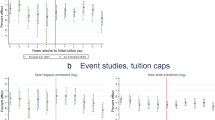Abstract
We examine the implications, for social choice, of individuals having an intrinsic sense of fairness. Taking the viewpoint that social justice reflects the moral attitudes of the constituent members, we analyze the effect of the intensity of the individual sense of fairness on the solution of Nash bargaining over random allocation procedures. We use a stylized model of university admission policies to illustrate our approach. We show that even if social policies are ultimately determined by the bargaining power of the different groups, a society whose members have a common notion of fairness tends to implement fairer admission policies when the intensity of the sense of fairness of individual members increases.
Similar content being viewed by others
References
Aumann RJ, Kurz M (1977) Power and taxes. Econometrica 45:1137–1161
Camerer CF (1997) Progress in behavioral game theory. J Econ Perspect 11:167–188
Harsanyi JC (1953) Cardinal utility in welfare economics and in the theory of risk-taking. J Polit Econ 61:343–435
Harsanyi JC (1955) Cardinal welfare, individualistic ethics, and interpersonal comparison of utility. J Polit Econ 63:309–321
Harsanyi JC (1977) Rational behavior and bargaining equilibrium in games and social situations. Cambridge University Press, Cambridge
Hume D (1740) Treatise of human nature. Dent JM and Sons, London, 1939
Jasso G (1989) Self-interest, distributive justice, and the income distribution: a theoretical fragment based on St. Anselm’s postulate. Soc Just Res 3:251–276
Kalai E, Smorodinsky M (1975) Other solutions to Nash’s bargaining problems. Econometrica 43:513–518
Karni E (1996) Social welfare functions and fairness. Soc Choice Welf 13:487–496
Karni E, Safra Z (2002a) Individual sense of justice: a utility representation. Econometrica 70:263–284
Karni E, Safra Z (2002b) The intensity of the sense of fairness: measurement and behavioral characterization. J Econ Theory 105:318–337
Kihlstrom RE, Roth AE, Schmeidler D (1981) Risk aversion and solutions to Nash’s bargaining problem. In: Moeschlin O, Pallaschke D (eds) Game theory and mathematical economics. North Holland, Amsterdam, pp 65–71
Machina M (2001) Payoff kinks in preferences over lotteries. J Risk Uncer 23:207–260
Myerson RB (1991) Game theory. Harvard University Press, Cambridge
Nash JF (1950) The bargaining problem. Econometrica 18:155–162
Rubinstein A, Safra Z, Thomson W (1992) On the interpretation of the Nash bargaining solution and its extension to non-expected utility preferences. Econometrica 60:1171–1186
Young PH (1994) Equity in theory and practice. Princeton University Press, Princeton
Author information
Authors and Affiliations
Corresponding author
Additional information
While working on the research that is summarized in this paper the authors visited several institutions. Edi Karni visited the Berglas School of Economics, Tel Aviv University and GRID, at Ecole Normale Superieur de Cachan. Zvi Safra visited CERMCEM and EUREQua, at the University of Paris I and LIP6, at the University of Paris 6. The hospitality of these institutions is gratefully acknowledged. We are also grateful to the editor and two anonymous referees for their very useful comments and suggestions. Zvi Safra thanks The Israel Science Foudation (grant 1299/05) for its support.
Rights and permissions
About this article
Cite this article
Karni, E., Safra, Z. Moral sentiments and social choice. Soc Choice Welfare 30, 427–446 (2008). https://doi.org/10.1007/s00355-007-0241-4
Received:
Accepted:
Published:
Issue Date:
DOI: https://doi.org/10.1007/s00355-007-0241-4




